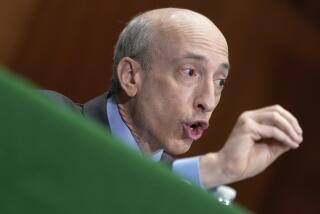An about-face on derivatives
- Share via
When a meltdown on Wall Street threatened the financial system in 1998, Gary G. Gensler helped orchestrate the rescue of Long-Term Capital Management, a big hedge fund that had set off the debacle with bad bets on exotic financial contracts known as derivatives.
But once the smoke cleared, Gensler, then a newcomer at the Treasury Department, closed ranks with others in the Clinton administration who decided against subjecting derivatives to tighter regulation.
“Looking back now, it’s clear we should have done more then,” Gensler said in a recent interview.
Since President Obama brought him back to government to lead the Commodity Futures Trading Commission, Gensler has aggressively pushed for strict new rules to govern derivatives as part of a proposed revamping of financial regulation.
He has appeared frequently before Congress to press his case. This has meant confronting former colleagues at Goldman, Sachs & Co., where he began his career, and at other big banks that have profited from the agency’s traditionally light touch.
“Both the financial system and the regulatory system failed the American public,” he said. “I want all options on the table.”
When Gensler, 51, discusses regulation, he speaks with a combination of candor reflecting his gritty Baltimore upbringing, confidence from his years as a senior executive on Wall Street and political caution born of more than a decade in Washington.
Gensler has faced skepticism about whether he is suited for the job after being part of the team that exempted derivatives from regulation a decade ago. Several senators held up his nomination for months out of concern that he was not committed to reining in Wall Street’s use of derivatives.
In just a few years, the derivatives trade has mushroomed into a huge market. Unregulated traders around the world have influenced and bet on just about anything -- including how much companies pay to borrow money, the value of currencies, and the prices of crucial goods such as oil and cotton.
The CFTC has long been a regulatory backwater, an agency important to certain financial and agricultural interests but lacking the stature of other financial regulators. With Gensler at the helm, the agency is emerging as a key player on two fronts.
Using existing powers, Gensler is pushing for tighter regulation of trading in oil, wheat and other commodities as evidence grows that speculation has been inflating prices.
He also has been out in front in publicly advocating strict regulation of derivatives. The Obama administration has endorsed his proposal to require that most derivatives be traded on exchanges in an effort to foster a more orderly market and make it easier for regulators to monitor trading.
In his previous government stint, Gensler also was at the center of a debate over whether new rules should be adopted for derivatives.
Brooksley Born, then CFTC chief, was pushing to regulate the arcane financial instruments. But Treasury Secretary Robert Rubin, Gensler’s boss and former colleague at Goldman, opposed the measures. Gensler saw his role at the time as supporting Rubin.
“Clearly, in hindsight we all should have pushed harder,” Gensler said.
At the CFTC, Gensler is planning to kick off a series of hearings next week to explore whether major financial firms have inflated the prices of energy and other commodities by amassing large holdings. And he remains adamant that the firms dealing in derivatives be tightly regulated.
“We have to get all the dealers,” he said. “It’s the one way you can be sure you are getting the whole market.”
More to Read
Inside the business of entertainment
The Wide Shot brings you news, analysis and insights on everything from streaming wars to production — and what it all means for the future.
You may occasionally receive promotional content from the Los Angeles Times.









